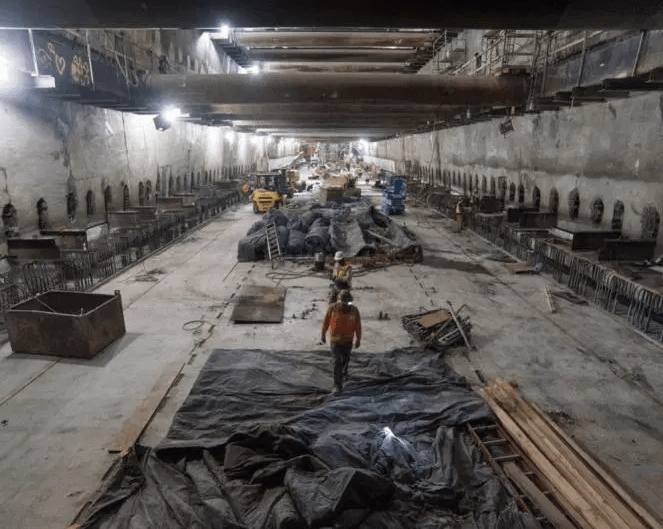Bay Area transit advocates look in envy at the expansion of the Line 14 in Paris, Crossrail in London, and, basically, any subway system in China--the fact is the rest of the world continues building transit much faster, and for less money than we do. Now the S.F. Examiner has broken the story that our only subway project, the relatively puny 1.7 mile Central Subway, is seriously delayed, again.
From the Examiner:
Muni officials are preparing to formally announce the $1.6 billion dollar Central Subway’s newest opening date, June 2021, after an exhaustive six-week fact-finding period by the subway’s new director, Nadeem Tahir, the San Francisco Examiner has learned.
Sources told the Examiner the San Francisco Municipal Transportation Agency expects to finish construction by June 2020, but will need to conduct testing for a year and will open for service by March or June 2021.
If anyone's still keeping track, the subway was originally supposed to open in 2018.
"This latest delay reminds us just how ill-equipped we are in the Bay Area to spend large sums of money effectively and efficiently on transit. Any new major capital money for transit expansion projects like this must come with significant reforms to how we approach, project planning, capital project delivery and construction," wrote Seamless Bay Area's Ian Griffiths, in an email to Streetsblog. "This project has been studied for over 20 years; it took nearly a decade of planning and design to agree on alignment."
"If Central Subway opens in 2021, that’s 11 years of construction for three subway stops and 1.7 miles of tunnel," added Cat Carter, spokesperson for the Transit Rider's Union. "We can’t wait that long for reliable, functional, efficient service."
Advocates worry this latest delay doesn't bode well for attempting to convince Bay Area voters to go in on a large regional mega-measure to expand transit. "Since Central Subway represents another example of how slothfully agencies like the MTA administer the funds entrusted to them, it won't help extracting another $100 billion of taxpayer money one bit," wrote Gerald Cauthen, President of the Bay Area Transportation Working Group and occasional Streetsblog contributor.
"Some might say that we don’t deserve nice things if we can’t figure out how to spend money wisely and effectively," added Beaudry Kock, also of Seamless Bay Area. "The Central Subway is an abject lesson in what happens when money is thrown at major projects without accompanying governance and institutional reform."
Part of the problem, said Griffiths, may be that the way we build projects reflects the factional way we operate different systems in the Bay Area. "Scale matters in order to get the most out of our large capital projects, and we in the Bay Area are poorly served by our lack of ability to scale, which is connected to our fragmented governance of transit. If we had a more professional, well-resourced regional transportation authority that oversaw capital projects, which was building and financing light rail projects all over Bay Area, we might have avoided many of the delays on the Central Subway due to poor oversight and the fact a that Muni has not built a new subway in 40 years. With greater scale, including financing power, we also might have been able to get more out of this project, like building it all the way out to the Marina in one fell swoop instead of breaking the project into inefficient pieces that are less cost-effective and prolong the public suffering through endless construction. We might have also explored different project financing and procurement options, as are commonplace in Canada, Australia, and Europe that would have help contain the risk for project delays, shifting the cost of these delays onto the private sector."
One advocate pointed to a feature The New York Times did two years ago about why subway construction takes so long compared to Europe. Although it focuses on New York projects, the delays and overruns closely parallel the Central Subway and other projects in the U.S., which are consistently more expensive and delay-prone compared to projects overseas. Also see Alon Levy's comparison of construction costs in the U.S. and overseas.
Livable City's Tom Radulovich, meanwhile, believes the priority now is to make sure the buses between Chinatown and Mission Bay are working as well as possible. "The community will depend on buses until the Subway opens, and better bus service will complement the subway after it opens, especially for folks north of the Chinatown station. Could lower Stockton be a two-way transit-priority street, or even a transit mall between Geary and Market, connecting to a two-way, transit-priority Fourth Street? The City ought to explore all the options," he said.
What do you think? What's it going to take to rebuild trust and get the region functioning again when it comes to these megaprojects? Post your thoughts below.






